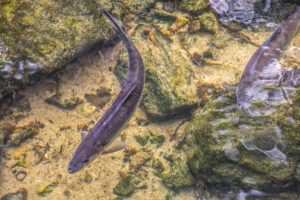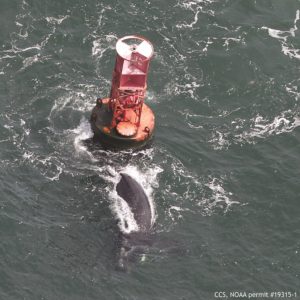With the ongoing pandemic, scientific research has been interrupted across Cape Cod.
Mass Audubon’s Wellfleet Bay Wildlife Sanctuary has placed five staff members on partial furlough due to funding freezes, according to director Melissa Lowe. Visiting researchers have postponed or canceled fieldwork, and the sanctuary has suspended all volunteer efforts. With fewer staff and volunteers, data collection has been disrupted.
Audubon science coordinator Mark Faherty said that, for larger data sets, one year of missing data won’t be so noticeable. This is the first year the Mass. Div. of Marine Fisheries groundfish trawl survey — in which fish from bottom trawls are counted to assess the population of different species — will not be conducted since the 1970s. But a small blip will not be hugely detrimental.
Missing one season of data from a smaller study, however, could significantly affect analysis. “For a short project — say, two years — that could be devastating,” Faherty said.
A season without science has its consequences, and Faherty worries that the pandemic will preclude new insights. “Interesting things may go undiscovered,” he said. “What are you not learning that you would have otherwise learned?”
Herring counts across the Cape have also been scratched, including two in Eastham. Concerns about crowds led the Association to Preserve Cape Cod (APCC), which coordinates herring counts and assimilates data each year, to recommend that this year’s counts be canceled.

APCC Executive Director Andrew Gottlieb said that missing a year of data can mean a whole generation of fish goes uncounted.
Since herring don’t return to their spawning ground for three years, “There’s a time lag,” he said. “There’s a lot of variability. If you have a really big class on their way back to their spawning ground, and they happen to be scooped up by a midwater trawler, that’s a whole population gone. You can miss things if you don’t have data every year.”
But Gottlieb said that people’s health is more important than herring numbers. “We can figure out the data gap later,” he said.
At the Provincetown Center for Coastal Studies, humpback whale monitoring has been postponed, interrupting the 30-year-old data set. “It’s never good to have gaps in something that’s so systematic and routine,” said Center for Coastal Studies Executive Director Rich Delaney. “But this database is really solid. The delay by a month or two won’t jeopardize it significantly.”
Delaney said that the center’s marine lab closed on March 13, and most of the staff have been working remotely since then. The scientists there are “always catching up on processing data,” he said, so there’s plenty of analysis and modeling to do at home.
At the Cape Cod National Seashore, fewer staff will be hired this season because fewer can be accommodated in the Seashore’s staff housing. Without the park’s usual people power, new projects, including water quality initiatives, will be postponed. Seashore Supt. Brian Carlstrom said it’s a disappointing but necessary step in the face of the pandemic.
Research That Must Go On
Though much research work has been shut down, endangered species and air and water quality monitoring continues.
Carlstrom said maintaining the devices that collect water and air quality data can be done in isolation. The Seashore has also hired two seasonal workers to maintain shorebird monitoring.
At Audubon, endangered species monitoring continues.
While the herring are being left alone in most towns, Wellfleet is the exception. After a brief delay, the Friends of Herring River received permission from the Seashore on April 8 to go ahead with the annual herring count along the Herring River.
Friends of Herring River board member Barbara Brennessel wrote in an email to the Independent that new protocols are being followed to ensure social distancing among counters. Only one household can be at a counting site at a time, and no equipment is shared between counting groups.

Herring runs began early this year, with fish coming up rivers in the last week of March.
“I don’t think we missed much in terms of data collection,” Brennessel wrote. “Some of us noticed that there were not many fish during the week the count was suspended.”
Right whale monitoring and disentanglement continues, as it’s considered an essential service. Only two people are allowed aboard the vessels simultaneously, and they stay six feet apart, Delaney said.
It’s impossible to follow social isolation guidelines during aerial surveys of the hundreds of right whales now in Cape Cod Bay, including at least two calves. But scientists are taking precautions by wearing masks, sanitizing, and reporting their temperatures daily.
“[The scientists] are heroes,” Delaney said. “There’s another species of animal that’s in critical state, too.”



